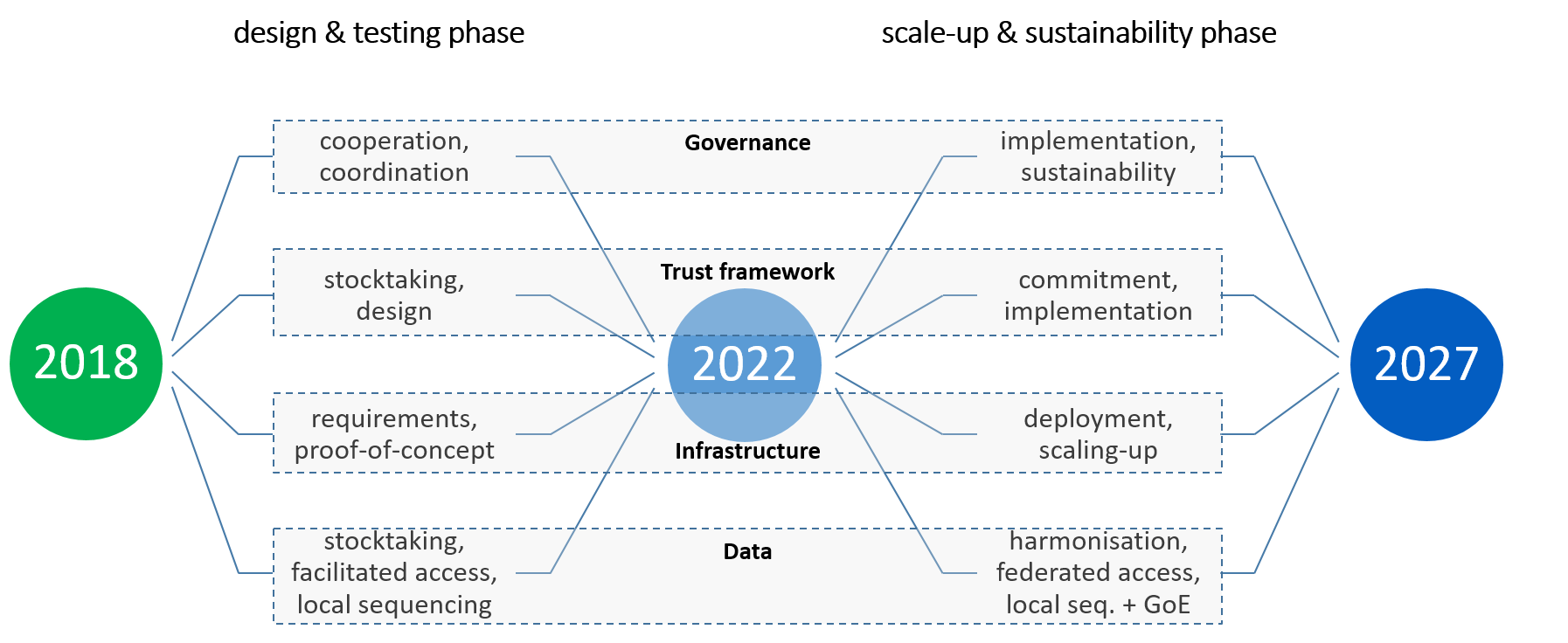As part of efforts to advance the health sector in the "post-pandemic" phase, The Kingdom of Bahrain has announced a project to establish a national digital platform to improve the management of health institutions in the Kingdom.
Where the health sector plays a pivotal role due to the importance of health services in maintaining people's health and improving the quality of life, Through these services, health sector institutions contribute significantly to both social and economic development. To maintain this essential role, health sector institutions must constantly keep pace with the latest innovations and technology. Because without it, the process of managing the work of health institutions becomes complicated and expensive, In particular in the context of the completion of administrative and legal procedures related to the issuance and follow-up of the licenses and classifications of these institutions, These procedures usually take weeks or months to complete. On the other hand, The organization of the work of these institutions requires ensuring control over all related services, crews, equipment, equipment and medicines. This is what prompted the Bahraini government, Via the National Health Regulatory Authority (NHRA), to issue a decision to launch a national digital platform to serve health institutions, and improve their efficiency, facilitate access to its services, Expedite administrative procedures, In addition to strengthening accountability in the health sector as a whole.
In the Kingdom of Bahrain, As in many countries, Administrative transactions such as licensing a health institution, classifying it or modifying its services require a lot of time and effort, This has become more complicated recently with the exceptional circumstances imposed by the COVID-19 pandemic that hinder or delay the completion of procedures. All these factors have prompted the Government of Bahrain to consider "post-pandemic" policies. Which aspires to put technology and digital technologies at the forefront of its priorities, Especially since Bahrain is one of the Asian countries that achieved the highest rates in the e-Government Development Index for the year 2020, according to a report issued by the United Nations, Having placed digital transformation in Bahrain's Economic Vision 2030, In addition to the opening of a WHO office in Manama, To become the first capital city to be awarded the title of "Healthy City" in the Middle East by the aforementioned organization.
The National Health Regulatory Authority (NHRA) is preparing a link to access the yet-to-be-named platform. Rather, the date of its official launch is set for later this year, The platform will include a page for each health institution, To serve as a reference for following up and updating the institution's services, applications and advertisements, As well as the validity of licenses for its equipment, equipment and crews, including doctors and technicians, and any irregularities you may witness.
As part of the 2021-2025 strategy, the National Health Regulatory Authority (NHRA) will work towards achieving three main interrelated and sequential goals: The first is to ensure the elements of regulation and accountability in the health sector, The second is to provide reliable, safe and equitable health services, Which will lead to the achievement of the third and most comprehensive goal, It is the protection of the health rights of all.
To achieve these objectives, The Authority has developed three main projects within the five-year plan, which will be based on the pillars of organization, control, development, control, training and implementation. The first project will update the decisions, regulations and laws governing the work of health institutions and facilities and their staff. As well as the regulations adopted by private sector institutions.
The second project, It will be concerned with obtaining international accreditation, This requires intensive efforts after obtaining the approval of the Tender Board to qualify for the status of an international body, As a global certification of quality management.
The third project focuses on the development of electronic systems first, This requires the automation of transactions and procedures in the coming years, To enable licenses and accreditations to be issued online for health and medical care institutions and centers, The automation project targets several aspects, starting with the registration of medicines, medical devices and health institutions, Through the systems of registration, licensing and issuance of its accreditations, In addition to following up and controlling medical errors and approving clinical research, In addition to professional development programs and training and rehabilitation packages that aim to meet any challenges related to maintaining the quality of health services and the efficiency of cadres, This will be done through the organization of conferences, workshops and seminars. Whereas the circumstances of the COVID-19 pandemic have posed an additional challenge to the Authority, which has taken measures to control the spread of the virus, By educating private healthcare institutions to strengthen their preventive measures and temporarily suspend non-emergency medical procedures, The Authority's teams conducted tours that included 595 inspection visits to various health institutions and centers to determine the extent of compliance with these procedures.
In addition, The objectives of the "Strategy 2021-2025" were set to complement the previous strategy 2016-2020, in which the National Health Regulatory Authority (NHRA) succeeded in implementing 90% of its projects. The Supreme Council of Health (SCH) also issued 21 decisions in the field of organizing medical staff, health institutions and medicines. The most important of which was the issuance of national standards for the classification and licensing of workers in the health sector, Updating the technical and engineering requirements of health institutions, As well as its evaluation, licensing and accreditation. Finally, Additional procedures have been put in place to ensure the full continuity of health services and basic care for those in need of treatment, Follow up on other health conditions or continue to receive various services.
And digitally, The Authority has updated its website, It has introduced a special section for investors within the site as a companion to the "Health Investment Center", which was opened at the Authority's new headquarters. While the center aims to provide advice and recommendations on investment opportunities in the health sector, The electronic section includes all the necessary information attached to the laws, rules and regulations governing health investments. SFDA has also succeeded in implementing the electronic system for clearing imported medicines. And the licensing system for health sector workers in cooperation with the Information and eGovernment Authority.
References:
https://www.un.org/development/desa/publications/publication/2020-united-nations-e-government-survey
http://www.emro.who.int/media/news/who-opens-country-office-in-bahrain.html






